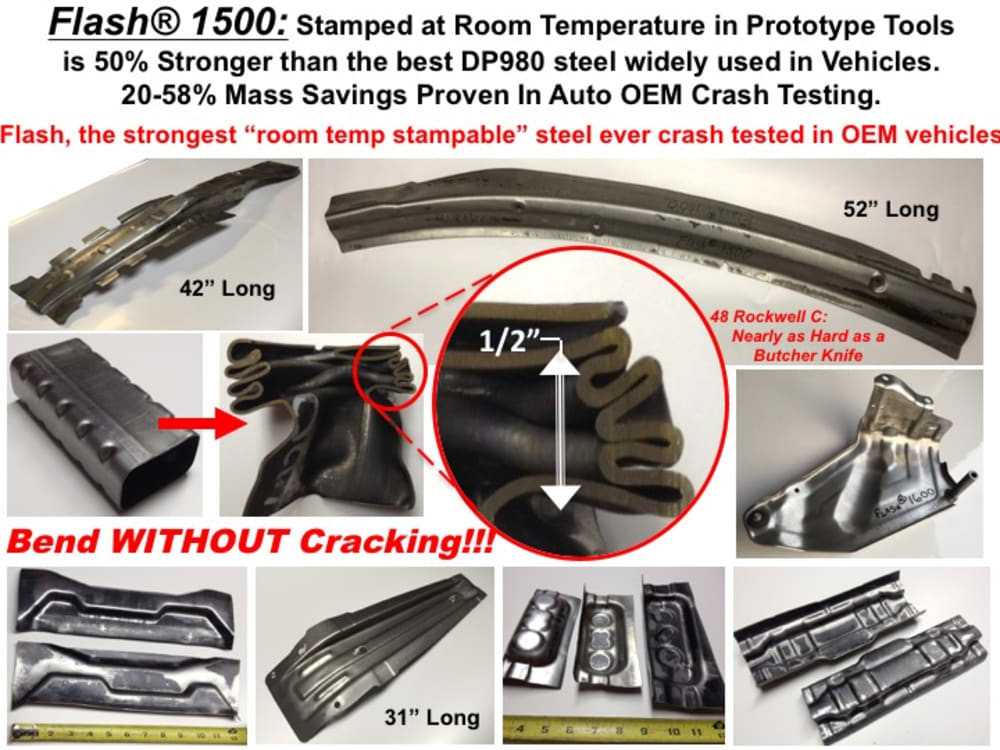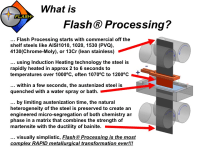The US Dept of Energy has long known that 10% mass savings improves automotive fuel economy 6-8%. As design engineers hone their skills over decades, vehicle mass reductions are sought with statements like “every gram, every day”, showing the intensity of the effort. Though estimates vary, removing a pound of mass is worthy of $1 cost increase. Inarguably, consumers would certainly pay $200 more for a 200 pound lighter, safer vehicle that would provide $100s in annual fuel savings. Automobiles remain heavy for one simple reason; no cost effective method exists to make cars 100s of pounds lighter despite decades of research . . . until now.
Recently, US Dept of Energy - Advanced Manufacturing Office’s Drs David Forrest and Theresa Miller wrote:
"With widespread use of Flash-processed steels, the U.S. automotive industry could save over 100 pounds of vehicle weight per car at reduced cost. The potential of Flash-processed steels goes beyond the auto industry, however, with applications in agricultural machines and heavy equipment, rail, ships and defense systems with performance improvements, lower cost and lifetime energy savings possible in each application area.” (Industrial Heating, May'17)
Globally patented Flash® Technology is a paradigm shift in steel research being cited regularly by leading metallurgists, such as Sir Harry Bhadeshia of Cambridge University, in conference keynote speeches. Flash Technology employs counterintuitive grain expansion mechanisms that force intragranular chemically heterogeneous grain refinement leading to “Maximum Strength” steel nanoscale microstructures. Requiring just seconds, minimal cost induction equipment heats readily available, low grade steel to inordinately high temperatures then water quenches using a proprietary thermal cycle. CAPEX is scalable based on product size and throughput such that “cottage industry” operations could fit in a one car garage. This, of course, is in stark contrast to the costly proprietary alloying, ten minute thermal cycles, and $400M furnaces of the Steel Industry.
Initially developed as US Army validated record setting Armor, Flash® Technology has migrated from the Defense Industry to the civilian automobile. Flash® Bainite has been tested by three Auto OEMs to make over a dozen “room temperature stamped” components 20 to 58% lighter. Lower cost Flash parts, at strengths of 1500-1800 megapascals, provided record setting energy absorption during OEM impact testing. Regrettably, after decades of research, the strongest room temperature stamped components keeping today's automobiles safe are typically only 980 megapascals, and rarely 1180mpa.
The Dept of Energy awarded an unprecedented (5) grants in only three years totaling $3.1M listing Flash as “the Next Big Thing” in “Early Commercialization”. Flash® is constructing a 10 ton coil-to-coil production line funded by an SBIR Phase 3 Grant, the first awarded by DOE in five years. Per the “Phase 3 Mandate”, Federal Agencies and Prime Contractors must “to the greatest extent possible” work with Flash Technology above all other derivations or copycats.
Stronger than titanium, lighter than aluminum, Flash® Processing creates Maximum Strength Steel with unmatched bend-ability, toughness, and weldability. Lower costs and higher mass savings with Flash are predicted over all other lightweight metals for vehicles.
Video
Like this entry?
-
About the Entrant
- Name:Gary Cola
- Type of entry:individual
- Software used for this entry:Catia
- Patent status:patented








